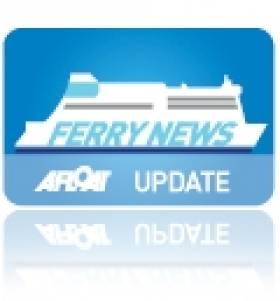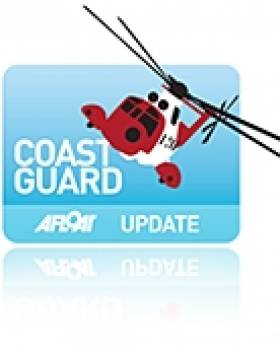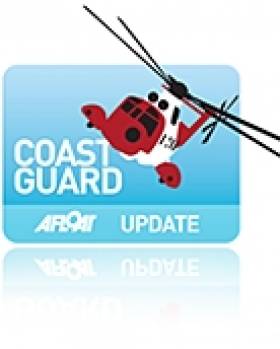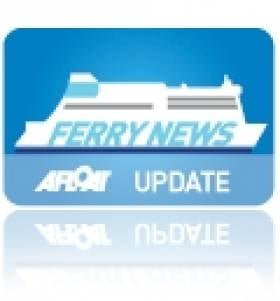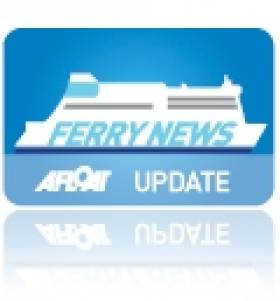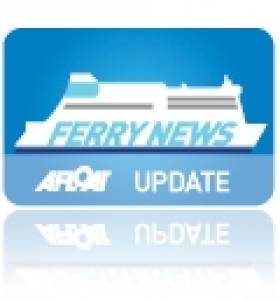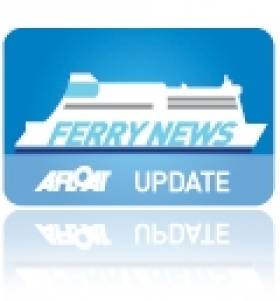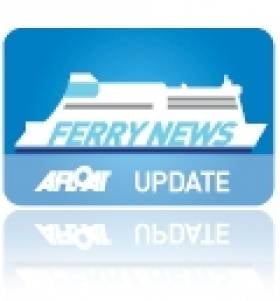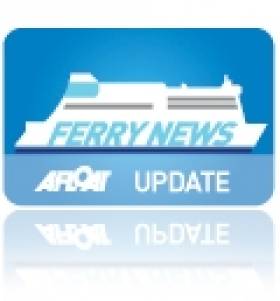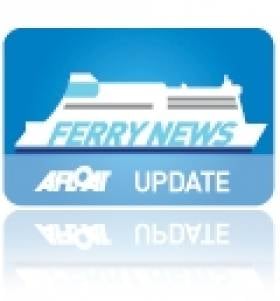Displaying items by tag: North Channel
#FarewellHSS- A fast-ferry that served the Belfast-Stranraer route, which no longer exists, departed Belfast for the final time at the weekend. The ferry HSS Stena Voyager is bound for Sweden where she is to be scrapped, writes Jehan Ashmore.
The 19,000 tonnes Stena Voyager is under tow to the Öresundsvarvet shipyard in Landskrona, where she will be recycled by a subsidiary of the ferry company, Stena Recycling.
All of the vessels various components will be recycled, as far as is possible, to maintain the company's environmental reputation. Some of the materials will even be reused in the form of car parts or furniture.
Stena Voyager was displaced on the Northern Channel route in November 2011 following the change of Scottish port, from Stranraer at the end of the lough to Cairnryan which is closer to the open sea.
In addition a pair of conventional yet fast ro-pax 'Superfast' ferries were introduced bringing superior facilities coupled with greater freight capacity.
These factors combined with a shorter passage time between Belfast and Cairnryan and rising fuel costs over several years saw the writing on the wall for the HSS craft, which when introduced in the mid 1990's were the pride of the Stena Line fleet.
The Swedish ferry giant commissioned a trio of HSS (High Speed sea-Service) fast-craft, whose futuristic appearance and technology was adopted from the world of aviation that included gas-turbine engines to power water-jets producing up to 40 knots.
Stena Voyager carried 1,500 passengers and 375 cars and she was launched onto the North Channel route in 1996, since then the fast-craft has carried more than 17m passengers and over 45,000 sailings.
"Whilst the HSS class was a unique and highly innovative development for Stena Line, unfortunately the spiralling costs of operating the Stena Voyager have become all too high. When the Voyager was first put into service fuel was approximately $20 per barrel and now the price is around $110 dollar, for a fuel hungry vessel this is simply untenable," said Michael McGrath, Stena Line's Chief Operating Officer.
The first of the revolutionary craft was HSS Stena Explorer which currently maintains the seasonal-only Dun Laoghaire-Holyhead having been also introduced in 1996. Final member of the class was HSS Stena Discovery which served Harwich-Hook van Holland from 1997, however she was the first to go and now serves operators out of Venezuela.
The concept of the HSS craft were also to compete with air-travel on the short hop between Northern Ireland and Scotland. In tandem the HSS ran alongside older conventional ferries, among them Stena Caledonia, which was sold last year to Indonesian operator ASDP and renamed Port Link.
Belfast Coastguard Manager Resigns As Station Takes On Extra Load
#Coastguard - For Argyll in Scotland reports that Richard Newell has resigned from his post as rescue co-ordination centre manager at Belfast Coastguard.
The news comes some weeks after the command base took on extra responsibility with the permanent closure of the Clyde coastguard station last month.
Britain's Maritime and Coastguard Agency (MCA) confirmed to the website that Newell resigned from his position around two weeks ago - and that he has assured the agency that his decision has no connection with the streamlining plans being undertaken across Britain's coastguard network.
However, For Argyll alleges Newell had made it known locally that "if he considered the future [of the coastguard service] was becoming dangerous, then he would go".
As previously reported on Afloat.ie, campaigners for the Clyde coastguard station in western Scotland were taken aback by the early transfer of helicopter dispatches to Belfast and Stornoway in November, ahead of the base's permanent closure on 18 December last.
More than 30 jobs were lost with the scrapping of the Clyde control centre at Greenock, with much of its role now being taken up by the Belfast command centre at Bangor across the North Channel - a change to the original plan for Scottish stations to share the load till 2015.
'Early Closure' of Clyde Coastguard Surprises Campaigners
#COASTGUARD - Campaigners for the Clyde coastguard station in western Scotland have suffered a blow with the news that all calls are now being routed to Stornoway and Belfast as of last night.
BBC News reports on a document leaked to the Coastguard SOS Campaign, which outlines that while the Clyde station itself is scheduled to close on 18 December, control of aerials (ie helicopter dispatches) to the stations at Stornoway and Belfast was on schedule to be completed by yesterday evening (Friday 16 November).
Campaigner Dennis O'Connor said this move meant that "Clyde will cease to exist operationally" from last night.
He also described it as a "direct challenge" to concerns from the Transport Select Committee in Westminster that the closure programme had started early with the closure of Forth coastguard in September "despite assurances that the replacement system of operation would be fully tested before any closures took place".
However, a spokesperson for the Maritime and Coastguard Agency said that the handover period "has been planned for some time. All the staff have been informed well in advance."
As previously reported on Afloat.ie, the scrapping of the Clyde control centre at Greenock will see the loss of 31 jobs, with much of its role being taken up by the Belfast coastguard at Bangor across the North Channel - a change to the original plan for Scottish stations to share the load till 2015.
New Belfast-Cairnryan Route Celebrates First Sailings
#FERRY NEWS - Demotix reports that the first ferries have sailed to Northern Ireland from the new £200m Stena Line port facility at Cairnryan in western Scotland.
The company's final sailings from Stranraer took place at the weekend before the official relocation to the new port, which lies closer to the mouth of Loch Ryan and the North Channel.
As previously reported on Afloat.ie, the Stena Superfast VII is serving the new route following the mothballing of the Stena Voyager service.
The ferry and her sister ship Stena Superfast VIII are on charter from Scandinavian ferry operator Tallink, and are the largest ferries ever to service the North Channel route.
Images of the new Belfast-Cairnryan Stena Line crossing are available HERE.
Stena Superfast VII Departs Poland for New Belfast-Cairnryan Route
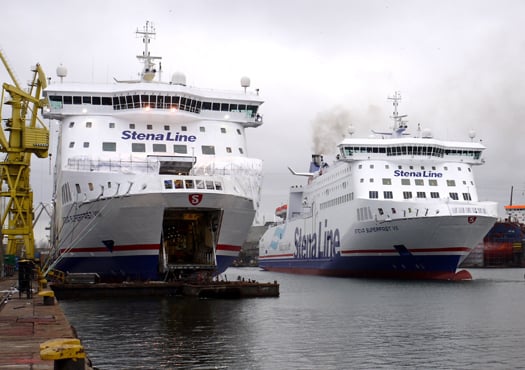
The New Superfast leaves Gdansk
The 30,285grt newcomer and her sister Stena Superfast VIII will become the largest ever ferries running on the North Channel , though prior to entering service on 21 November, they will undertake berthing trials and crew training.
For the next two-years the sisters are on charter from Scandinavian operators Tallink, and are to operate the new 2 hour 15 minute route with 12 crossings daily. The ten-deck ships can carry up to 1200 passengers, 660 cars or 110 freight units. The sisters will be re-gistered in their new homport of Belfast.
The relocation of Scottish ferry port and the introduction of the Superfast sisters will replace the existing pair of conventional ferry tonnage, Stena Caledonia and Stena Navigator (1984/15,229gt) the latter vessel is believed to be sold. In addition HSS sailings will cease causing the HSS Stena Voyager to become redundant, she was the second of the trio of pioneering HSS 1500 craft built.
When Stena Superfast VII departed Gdansk, she passed the Stena Vision which operates Stena Line's Karlskrona-Gdynia route, the Baltic Sea city lies to the west of Gdansk. Also in Gdansk was the Stena Feronia, the former Irish Sea serving Visentini built ro-pax Dublin Seaways, which was operated albeit briefly by DFDS Seaways last year on the Dublin-(Birkenhead) Liverpool service.
She served under her new Scandinavian owners but the firm's first foray into the Irish market lasted a mere six months. DFDS Seaways sold their Irish Sea network to Stena Line (to read report click HERE) with the exception of their Dublin-Birkenhead service which closed. In addition the Dublin-Heysham freight-only route which closed until re-opened by Seatruck Ferries. The route is currently served by Anglia Seaways, the freightferry which DFDS previously used on the route is on charter to the operator.
- DFDS Seaways
- Baltic Sea
- Stena Line
- Ports and Shipping News
- Seatruck Ferries
- North Channel
- Stranraer
- Dublin Seaways
- Ferry news
- Tallink
- Loch Ryan Port
- HSS Stena Voyager
- Stena Caledonia
- Stena Navigator
- Belfast Lough News
- HSS
- Visentini ropax
- BelfastCairnryan
- Stena Superfast VII
- Stena Superfast VIII
- Stena Superfast
- Superfast Sisters
- North Channel ferry routes
- Stena Feronia
- LRP
- BirkenheadBelfast
- DublinBirkenhead
Award Winning Stena Line Look Forward to New Northern Route
"We are moving into a very important time for Stena Line's operation between Northern Ireland and Scotland. On November 21 we are scheduled to start our new Belfast to Cairnryan service which will also see the introduction of two new vessels, Stena Superfast VII and Superfast VIII, the largest ships every to have sailed between Northern Ireland and Scotland," he continued.
Stena Line's switch of Scottish terminal from Stranrear to the new purpose built facility in Cairnryan which is some 8-miles closer to the open sea along Loch Ryan will reduce sailing times by 35 minutes down to 2 hours 15 minutes.
The 30,285grt Stena Superfast VII and Superfast VIII sisters can carry 1,200 passengers, 660 cars and 110 freight-unit / trucks. In addition they have a novel Nordic Spa facility incorporating a sauna and Jacuzzi.
The 206m pair will compete with rivals P&O (Irish Sea) which operates also from a neighbouring terminal in Cairnryan where another pair of sisters European Highlander and European Causeway provide 2-hour sailings to Larne.
Currently Belfast-Stranraer sailings are served by conventional tonnage ferries Stena Caledonia and Stena Navigator which lost engine-power on 14 October, to read more click HERE.
In addition fast-sailings are run by the expensive to operate HSS Stena Voyager which manages a faster crossing time on the existing route by shaving 15 minutes off the link between Loch Ryan and Belfast Lough. In 2008 the terminal in Belfast was relocated downriver to Victoria Terminal 4 (VT4) on the eastern edge of the port from the older inner-city terminal at Albert Quay.
Stena are to lease the 'Superfast' pair for three years from Scandinavia operator Tallink and they are to directly replace both the HSS and conventional ferries.
Stranraer-Belfast Ferry Left Adrift Off Scottish Coast
The Press Association reports that the Stena Navigator was en route from Stranraer to Belfast when both of its engines broke down.
The ferry - carrying 70 passengers and 47 crew - was adrift some four nautical miles west of Corsewall Point lighthouse at the Mull of Galloway.
Clyde Coastguard confirmed that two Svitzer tugs, Norton Cross and Willowgarth, were dispatched to the vessel with the aim of towing it to Belfast, but the ferry managed to get one enging going and propelled itself at half power across the North Channel.
The Navigator arrived in port accompanied by the tugs around 4:30am. No injuries were reported in the incident.
P&O Close Seasonally Operated Fast-Ferry Services
As for the remaining winter-serving fast-ferries they are Stena Line's HSS Stena Voyager (1996/ 19,638grt) between Belfast-Stranraer, in tandem with conventional ferries. Next month this route will close as the Scottish terminal relocates to a new ferryport nearby at (Loch Ryan Port) Cairnryan.
In addition two sister-ferries, which are undergoing modifications and an upgrade for their two-year charter on the North Channel, will directly replace the two-hour passage times it takes for the HSS fast-ferry and the ferries Stena Caledonia and Stena Navigator which take 2hrs 50 minutes.
With the introduction of the new tonnage to the Belfast-Cairnryan route, sailings times will be reduced to 2hrs 15mins. Ironically the new ferries which albeit will be the largest to serve on any North Channel route will actually be some 15 minutes slower on the newer-shorter distance route compared to the HSS fast-ferry operated Belfast-Stranraer sailings.
The second fast-ferry service is operated on Irish Ferries Dublin-Holyhead route using Jonathan Swift (1999/5,989grt) which is marketed as the Dublin 'Swift'. She runs year-round in addition to the cruiseferry Ulysses.
Also operating fast-ferry craft is the Isle of Man Steam Packet Company's Manannan (1998/5,029grt) but this is on the none cross-channel route between Douglas and Liverpool.
Sponsorships of Ice-Sea Giants
Stena Line themselves will be looking forward to introducing their own giants when two of the largest ferries are to be introduced on the North Channel in the Autumn. The two chartered 30,000grt sisterships are Superfast VII and Superfast VIII. To see the vessel breaking through an an ice-flow, click PHOTO. The 203m long pair can take 1,200 passengers, around 660 cars or 110 freight vehicles. To read more about these 'Superfast' class vessels and the new £80 port terminal click HERE.
The company's area director Michael McGrath said: "It's quite fitting that we are teaming up with the Stena Line Belfast Giants at this time as we prepare to introduce two of the largest ferries every to sail between Northern Ireland and Scotland when we open our new route and port in Cairnryan this November. The two Superfast vessels will be another two Giants to add to our team."
Last year Stena Line made a £40m acquisition of the Belfast to Liverpool (Birkenhead) and Heysham routes and four vessels from DFDS Seaways. The deal was approved by the Irish authorities but remained subject to clearance from the UK's Competition Commission until late last month when they fully approved the acquisition.
This brings to six routes the company runs on its Irish Sea route network where over two million passengers were carried each year, more than its rival ferry operators combined.
- DFDS Seaways
- Belfast Harbour
- Stena Line
- North Channel
- Competition Commission
- BelfastHeysham
- Superfast VII
- Superfast VIII
- Belfast Lough News
- Belfast Port
- Odyssey Arena
- Belfast Giants
- BelfastCairnryan
- New ferryport
- Nottingham Panthers
- Sheffield Steelers
- Hockey Festival Weekend
- BelfastLiverpool (Birkenhead)
- Irish Sea ferry companies
- Irish icehockey
Prior to her arrival on the North Channel, Norcape had been laid-up in Liverpool since February 2010 after the former B+I Line vessel (MV Tipperary) was replaced by European Endeavour on the central corridor route to Dublin. As of this week the ro-pax freight vessel which has been running in a freight-only mode will now carry motorists likewise to her route fleetmates Norbank and Norbay.
With the departure of European Mariner from the Irish Sea, she follows a trio of former Stena Line freight-ferry sisters which were made redundant since the closure of the Belfast-Heysham route late last year. It is believed the sisters Stena Seafarer, Stena Leader and Stena Pioneer have been sold to Russian interests to serve in the Black Sea in connection to the 2014 Winter Olympics in Sochi.
The sisters were renamed, Stena Pioneer became Ant 1, Stena Seafarer is the Ant 2 and Stena Leader is the Anna Marine. They departed Belfast Lough in mid-June to Sevastopol in the Ukraine under the Moldovan flag and with a port of registry in Giurgiulesti.
- Port of Larne
- Belfast Lough
- Stena Line
- Ports and Shipping News
- RoPax
- North Channel
- P&O (Irish Sea)
- B+I Line
- European Endeavour
- Ferry news
- Belfast Lough News
- RosslareFishguard
- LarneTroon
- European Mariner
- Freightferries
- MV Tipperary
- Central Coridoor route
- BelfastFleetwood
- Stena Europe ferry
- 2014 Winter Olympics
- Sochi
- Black Sea
- Turkish shipbreakers
- Izmir
- Turkey
- Winter Olympics 2014
- Irish Sea ferry motorists



























